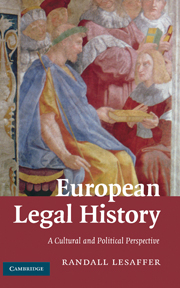Book contents
5 - Emulatio (the Early Modern Age, 1453–1648)
from Part II - The civil law tradition
Published online by Cambridge University Press: 15 August 2019
Summary
A Politics and the state
A new dawn?
Hamlet: What news?
Rosencrantz: None, my Lord, but that the world's grown honest.
Hamlet: Then is doomsday near.
The Italian Renaissance
More than a century before the Italian Renaissance, Petrarch (1304–74) had already announced the dawn of an age, an age of revival. The epoch between the fall of the Roman Empire and his own time – the Middle Ages – he described as an age of decay and barbarism. This chronology of decay and revival was to grow into one of the most enduring myths in European historiography. Most eighteenth- and nineteenth-century historians held to the view that the advent of modern, Western civilisation began with the Italian Renaissance and with humanism in the fifteenth and sixteenth centuries.
Since the publication of Haskins's The Renaissance of the Twelfth Century (1927), these views have been revised. The foundations of Western civilisation were laid not by the Renaissance of Leonardo da Vinci (1452–1519), Michelangelo Buonarotti (1475–1564), Raffaello Sanzio (1483– 1520) and Desiderius Erasmus (c.1466–1536), but by the older Renaissance of Anselm, Abelard and Gratian. The rediscovery of Antiquity began not in the fifteenth century but in the late eleventh century. But what then, in the light of all this, was the significance of the Italian Renaissance within the evolution of Western civilisation? Is it still correct to speak of a caesura between the Middle Ages and the Modern Age?
The response to the latter question is undeniably yes. The fifteenth century brought a number of important changes that ushered in a new era in the political and cultural history of the West. The changes may be seen as part and parcel of a general revival of western Europe following the stagnation and decline that marked the fourteenth century. Many intellectuals of the Renaissance thought about their own times, as Petrarch already had, in terms of revival and renewal. Although the term ‘Renaissance’ did not obtain general currency until the nineteenth century, the great artists, thinkers and politicians of that period often considered themselves the trail-blazers of a new age.
- Type
- Chapter
- Information
- European Legal HistoryA Cultural and Political Perspective, pp. 289 - 371Publisher: Cambridge University PressPrint publication year: 2009



